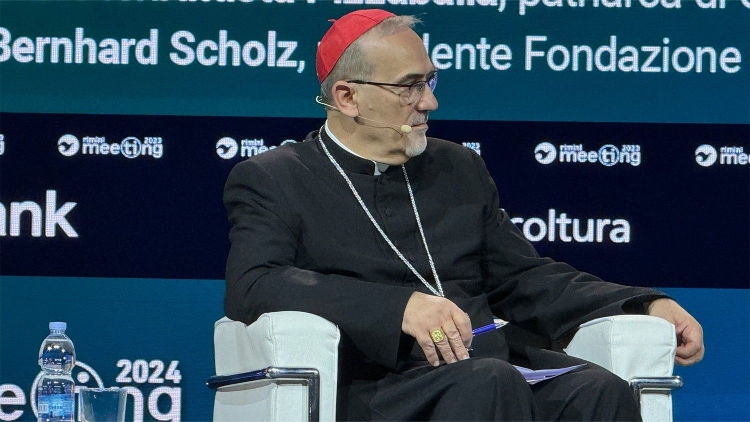In Rimini before inaugurating the Meeting, in an interview with the Vatican media the Latin Patriarch of Jerusalem spoke about the "small hopes" found in the Holy Land, which are essential to not give in to violence: we are working to support the Catholic community in Gaza and the West Bank by providing food. There is a culture of reconciliation that needs to be promoted to escape the oppression that has been generated.
Benedetta Capelli - Rimini
"We cannot speak of peace at this moment." The words of Cardinal Pierbattista Pizzaballa, the Latin Patriarch of Jerusalem, clearly reflect the situation in the Holy Land, with the conflict between Hamas and Israel ongoing for months. Speaking to Vatican media before the opening of the Rimini Meeting - which the cardinal inaugurated with a conference titled "A Presence for Peace" - the Patriarch emphasized the need to "work for a ceasefire, to halt military operations to begin a healing process, to build trust in one another."
"The path is there," Cardinal Pizzaballa stated, "but the desire to follow it at an institutional level is lacking; it requires political and religious leadership capable of solving the crisis." He emphasized the importance of doing everything possible, even starting from the grassroots level.
"Small Hopes"
Hope is a word that is needed at this time, but the cardinal stressed that we must not confuse the meaning of words. "Hope," he observed, "does not mean that things are about to end; the short-term outlook is not positive. Hope is an inner attitude that enables one to see with the eyes of the Spirit what human eyes do not see." The small hopes animate the local Church, engaged in Gaza and the West Bank in supporting the small community of about 600 people with the distribution of food. The Latin Patriarch of Jerusalem recalled the commitment to open clinics, reopen a school that has been closed for a year, and restart the dynamics of "normal" relationships, "but which help," he said, "to escape from a cloak of oppression to create work opportunities, even if they are lacking."
Peace is a Culture
Concluding his interview, Cardinal Pizzaballa reminded us that everyone can do something to create peace. "Peace is a culture, not something one must do; it is politics, it is education, it is the commitment of the media, it is working in all aspects, in a globalized world where no one is an island. Peace is a culture."
Negotiations, the Last Train
On the stage of the Meeting, in dialogue with the president of the Bernard Scholz Foundation, a meeting that effectively inaugurated the 45th edition, Cardinal Pizzaballa reflected on his 35 years of life in the Holy Land and his growth in interreligious dialogue. He could not avoid mentioning current events: "We are at a decisive, critical moment, with ongoing dialogues," he said. "The war will end; I hope that something will be resolved through negotiations: I have my doubts, but it's the last train." The Patriarch of Jerusalem did not hide the risk of "degeneration." "The language of mutual rejection," he added, "has become a daily matter that is breathed in by the media, and it is something truly dramatic." His exhortation is to pray, especially to counter "those attitudes of hatred, mistrust, and deep contempt" that are felt. In rebuilding tomorrow, the commitment of all will be necessary.
Regarding interreligious dialogue, he did not hide the difficulties in this particular moment. "This situation," Cardinal Pizzaballa explained, "is a watershed; there are no public meetings, and at the institutional level, we are struggling to talk to each other. We cannot meet." His final invitation was for dialogue that is more communal and not elitist; religious leaders have a great responsibility to create communities that do not close themselves off but instead lift their gaze.







